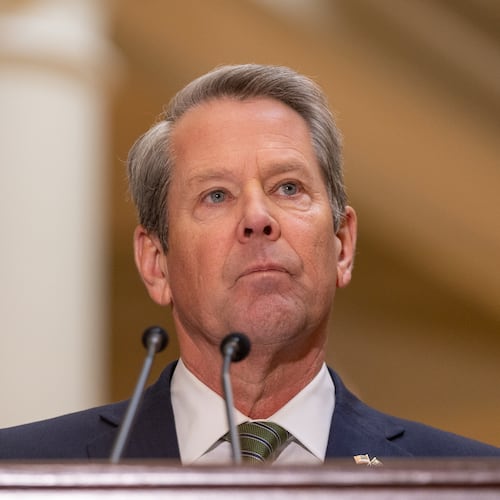When Christine Cooper Nowicki was placed on administrative leave from the Centers for Disease Control and Prevention in February, it was just the beginning of months of uncertainty.
Cooper Nowicki, 36, is among the thousands caught in limbo as legal battles challenging President Donald Trump and the Department of Government Efficiency’s efforts to shrink the federal workforce play out in court.
She officially lost her job as a public health adviser May 8, leading to another challenge: obtaining unemployment benefits.
“It’s just very chaotic,” she said.
It took nearly a month after her termination before Cooper Nowicki received paperwork from the U.S. Department of Health and Human Services to show she worked for the CDC. Without that paperwork, processing her unemployment claim could have faced additional delays.
The federal terminations come as the Georgia Department of Labor is already fraught with its own challenges. The agency’s rate for processing unemployment insurance claims was 12 percentage points below the federal standard in the first quarter of 2025. Performance improved in the second quarter, but processing was still nearly 9 percentage points below the standard.
Credit: Gray Mollenkamp
Credit: Gray Mollenkamp
The department has a history of issues, many of which were exacerbated in 2020 when the COVID-19 pandemic flooded the office with an unprecedented number of jobless claims. During the early months of the pandemic, only 4% of calls were answered, while 78% never reached GDOL staff because of limited system capacity.
GDOL has taken steps to improve its unemployment insurance system and customer service, but its 2025 fiscal year budget of $8.5 million was nearly $10 million below what agency leaders requested from the state, according to a Georgia Budget and Policy Institute report.
Meanwhile, the department’s workforce has shrunk by roughly 13% over the past five years to just 871 active employees this year to staff 35 offices across the state.
And the influx of the newly unemployed comes as GDOL works to replace the information system used to handle unemployment insurance claims. The new system won’t come online until next year, according to a state audit released this month.
The department has also implemented a new customer relations management system and a “virtual agent” to answer routine calls to improve customer service.
But other findings in the audit show signs the department is struggling with its limited resources. For example, GDOL reported that it does not have the money for permanent staffing to assist with customer calls and has instead hired temporary staff.
On Wednesday, the department released a statement acknowledging issues.
“Due to high call volume and limited staffing levels, less than a third of incoming calls do not connect with a live representative,” the statement read. “While we’ve made significant progress improving response rates this year, staffing shortages continue to impact our capacity during peak periods.”
The statement said the department received 14,251 calls last week across all service lines, and customers who select a callback option typically receive one within 24 business hours.
The department received over $14 million in federal funding for fiscal year 2024 to modernize its unemployment insurance system and make its application process more user-friendly. However, in a July 11 memo, Gov. Brian Kemp instructed state agencies to prepare for tighter budgets amid federal cuts included in Trump’s “big, beautiful bill.”
About 2,400 federal workers with the CDC were laid off in April, but the overall state unemployment rate remains low. In May, Georgia’s unemployment rate dipped to 3.5% for the first time in nearly a year and that rate continued in June. The national rate was 4.1% in June.
In interviews with The Atlanta Journal-Constitution, some Georgians said their calls to the department went unanswered, and their emails were met with automated messages.
Tyiesha Brown, an Atlanta resident, had worked for Delta Air Lines as a ramp agent before losing her job earlier this year. In the four months she spent looking for a new job, she never heard back from the department on her claim.
Brown was forced to tap into her retirement savings to support herself and her family while out of work.
“Honestly, I had to cash out my 401(k), which really sucks,” said Brown, 34. “Now I have to start all over.”
Brown said she was fortunate to find a job three weeks ago but is still frustrated by her experience with GDOL.
“Now I have a job, so when they finally do get around to me, it’s going to be like, ‘Well, now you don’t need it,’” she said. “But in those months, I followed all the rules that I was supposed to, which was job hunting every day. I still would want my back pay.”
The story has been corrected to clarify that more than two-thirds of incoming calls to the Georgia Department of Labor connect with a live representative and that the department has hired temporary staff to assist with customer calls. Additionally, it has been corrected to show that the number of offices in the state is 35, which includes the department’s headquarters in Atlanta. Additional context was added regarding the department’s call processing rate.
Keep Reading
The Latest
Featured





